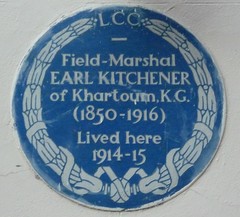Sir Earl Field-Marshal Viscount Lord Horatio Kitchener KP KG OM GCB KStJ GCSI GCMG GCIE


Sir Earl Field-Marshal Viscount Lord Horatio Kitchener KP KG OM GCB KStJ GCSI GCMG GCIE
(1850-1916)
soldier, statesman, British Army Lieutenant (1871-1883), British Army Captain (1883-1896), Companion of The Most Distinguished Order of Saint Michael and Saint George (1886-1894), Companion of the Order of the Bath (1889-1896), Knight Commander of The Most Distinguished Order of Saint Michael and Saint George (1894-1900), British Army Major General (1896-1899), Knight Commander of the Order of the Bath (1896-1898), Knight Grand Cross of the Order of the Bath (from 1898), 1st Baron Kitchener of Khartoum (1898-1902), British Army Lieutenant General (1899-1902), Knight Grand Cross Order of St Michael and St George (from 1900), Order of Merit recipient (from 1902), British Army General (1902-1909), 1st Viscount Kitchener of Khartoum, of the Vaal in the Colony of the Transvaal and of Aspall (1902-1914), Knight Grand Commander of the Most Eminent Order of the Indian Empire (from 1908), Field-Marshal (from 1909), Knight Grand Commander of the Most Exalted Order of the Star of India (from 1909), Knight of The Most Venerable Order of the Hospital of Saint John of Jerusalem (from 1910), Knight of the Order of St Patrick (from 1911), 1st Earl Kitchener of Khartoum and of Broome (from 1914), Viscount Broome (from 1914), Baron Denton (from 1914), and 853rd Knight of the Order of the Garter (from 1915)
Commemorated on 2 plaques
Field Marshal Earl Kitchener of Khartoum, KG (1850-1916) lived here 1914-1915
2 Carlton Gardens, Westminster, SW1, London, United Kingdom where they lived (1914-1915)
1st Earl Kitchener of Khartoum (1850-1916) Soldier and Statesman lived here 1911-1916
Broome Park, Canterbury Road, Barham, Canterbury, United Kingdom where they lived


